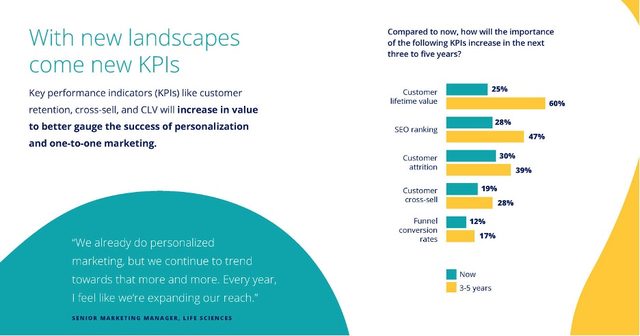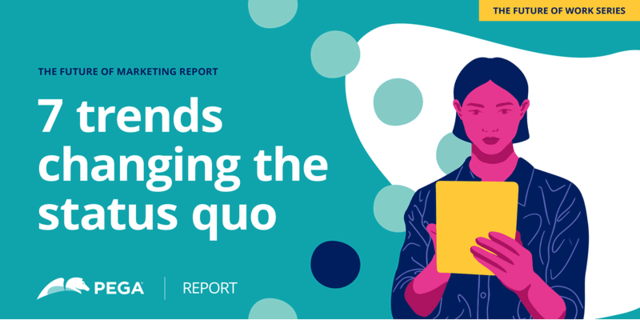In the past three to five years, we've all experienced unprecedented economic uncertainty and natural disasters compounded by a global pandemic, upending the way we live and work. And it’s no different for marketers. Marketing is also having a tumultuous moment.
We’ve seen a rise in consumer expectations and the fall of traditional marketing strategies and technologies giving way to the next evolution of customer engagement. In June, we released The Future of Marketing: Challenging the Status Quo, a report that crystallizes trends and opinions from more than 750 marketing leaders across 11 different countries for their predictions on how this evolution will continue to change in the next three to five years.
Much of what we’ve learned from this report isn’t new:
- consumers desire personalized and contextually relevant experiences,
- omnichannel marketing is the only way we’ll succeed,
- and marketing leaders will need to upskill their teams to compete in an environment that’s constantly in flux.
What IS new is that organizations are now forced to focus on just how to achieve the promise that data-driven marketing made several years ago.
Better marketing requires better KPIs

2023 is approaching and most marketers know that Google is deprecating third party cookies in its Chrome Browser in the next two years. With upwards of 60% of web traffic moving through Chrome, third-party cookie tracking has been a primary method for many marketers seeking to connect disparate channels and unify messaging to consumers. It’s also traditionally been a tool to measure customer engagement, albeit not a very accurate one. The cookie-less future is untested. However, what’s for sure is that along with better technology, better key performance indicators (KPIs) (such as customer retention, cross-sell, and CLV) will increase in value to better gauge the success of personalization and one-to-one marketing.
Shift the measurement mindset
To prove that their programs are working, marketers must be able to measure what matters. That no longer refers to KPI’s like click through rates and page views. Clicking doesn’t mean buying. Clicking doesn’t mean satisfaction. It’s time to shift over to metrics that help us understand if our marketing programs are healthy, if our customer relationships are healthy, and if our strategies have longevity.
Metrics like customer lifetime value, return on advertising spend, customer retention, net promotor scores etc. tell us more about our customer relationships, shifts that need to be made and when to make them. These metrics measure long-term revenue potential, they help us budget effectively and know the answer to the question, “Is my customer engagement strategy working?”. Driving short-term sales is also important, but if that’s the core focus, your business won’t sustain.

Everything you thought you knew about marketing is set to be disrupted
Customers don’t have time to cut through marketing noise. That’s why true personalization offers contextually relevant and perfectly timed messages fueled by tech that interprets data instantly.
Proof points from Pega’s Future of Marketing report confirm this. The highest number of survey respondents at 35% stated that the importance of customer lifetime value as a metric will increase in the next three to five years, while only 5% said the same about Click-Through-Rate:
“MarTech 2.0 has the capabilities necessary to establish, maintain, and track lifetime relationships with customers. No wonder, then, that CLV is the metric our respondents said will most increase in importance – from a key metric for just 30% of respondents today to a key metric for 57% in three to five years’ time. This significant shift expands the focus of marketing from the buying lifecycle to the customer lifecycle – and marketers can finally track their long-term results.”
Additionally, SEO rankings, customer attrition, cross-sell, and conversions rates are all on the list of metrics that are growing in importance to the marketers we surveyed. Winston Churchill famously said, “perfection is the enemy of progress.” and while we haven’t achieved an industry standard on the perfect marketing metrics, moving on from click throughs and impressions is a solid progression toward measuring what matters for brands in 2022.
Are you ready for the future of marketing? Check out this webinar replay and learn how to future-proof your marketing function and get ahead of the curve with the right strategies, technologies, and skillsets.

